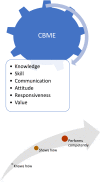Online Medical Education in India - Different Challenges and Probable Solutions in the Age of COVID-19
- PMID: 33692645
- PMCID: PMC7939236
- DOI: 10.2147/AMEP.S295728
Online Medical Education in India - Different Challenges and Probable Solutions in the Age of COVID-19
Abstract
Introduction: During the COVID-19 pandemic, most educational institutions have opted for online education rather than traditional modes of education to protect their employees and students. Online education has been gaining momentum in almost all countries around the world. This coincides with the recently introduced competency-based medical education in India which has embraced online education. This poses a new challenge for the institutions involved, the instructors or teachers, and the students since they must adapt quickly to the new mode of learning. Online education requires teachers to improve their competency in three major areas; pedagogy, technology, and content knowledge. Some of the challenges include; lack of technological skill, poor time management and lack of infrastructure. As technology rapidly advances, health care education systems must also advance in tandem. To implement the new competency-based system and online education, the institutions and the individuals must realize the importance of online education, identify the barriers and quickly work on solutions for success.
Methods: This review was conducted based on various research papers on the topic of online medical education, the challenges faced by faculty members, and the opinion of students on this dilemma. Search terms included online medical education, COVID19, competency-based medical education.
Conclusion: This review identified various challenges posed by online education on the current medical curriculum, faced by both faculty members and students, especially under the light of the Competency-Based Undergraduate Curriculum for Indian Graduates. Different solutions were proposed to overcome these challenges.
Keywords: COVID-19; competency-based medical education; online medical education.
© 2021 Nimavat et al.
Conflict of interest statement
The authors report no conflicts of interest in this work. References1.CDC COVID Data Tracker.Available from: https://www.cdc.gov/coronavirus/2019-ncov/index.html. Accessed 217, 2021.2.ByrnesYM, CivantosAM, GoBC, McWilliamsTL, RajasekaranK. Effect of the COVID-19 pandemic on medical student career perceptions: a national survey study. Med Educ Online. 2020;25(1):1798088. doi:10.1080/10872981.2020.1798088327063063.IshP, SakthivelP, GuptaN, MalhotraN, RajeshwariM. E-learning of medical residents during COVID-19: perspective from a developing nation. Postgrad Med J. 2020;postgradmedj-2020-139022. doi:10.1136/postgradmedj-2020-1390224.India MC. Competency Based Undergraduate Curriculum for the Indian Medical Graduate. 2018.5.ModiJN, GuptaP, SinghT. Competency-based medical education, entrustment and assessment. Indian Pediatr. 2015;52(5):413–420. doi:10.1007/s13312-015-0647-5260619286.RoseS. Medical student education in the time of COVID-19. JAMA. 2020;323(21):2131–2132. doi:10.1001/jama.2020.5227322324207.SolankiA, KashyapS. Medical education in India: current challenges and the way forward. Med Teach. 2014;36(12):1027–1031. doi:10.3109/0142159X.2014.927574251892768.BarteitS, GuzekD, JahnA, BärnighausenT, JorgeMM, NeuhannF. Evaluation of e-learning for medical education in low- and middle-income countries: a systematic review. Comput Educ. 2020;145:103726. doi:10.1016/j.compedu.2019.103726325656119.SaiyadS, VirkA, MahajanR, SinghT. Online teaching in medical training: establishing good online teaching practices from cumulative experience. Int J Appl Basic Med Res. 2020;10(3):149–155. doi:10.4103/ijabmr.IJABMR_358_203308873510.O’DohertyD, DromeyM, LougheedJ, HanniganA, LastJ, McGrathD. Barriers and solutions to online learning in medical education – an integrative review. BMC Med Educ. 2018;18(1):130. doi:10.1186/s12909-018-1240-02988004511.CostelloE, CorcoranM, BarnettJ, et al. Information and communication technology to facilitate learning for students in the health professions: current uses, gaps and future directions. Online Learn. 2014;18(4). doi:10.24059/olj.v18i4.51212.DyrbyeL, CumynA, DayH, HeflinM. A qualitative study of physicians’ experiences with online learning in a masters degree program: benefits, challenges, and proposed solutions. Med Teach. 2009;31(2):e40–e46. doi:10.1080/014215908023661291933066313.Del RioC, MalaniPN. 2019 Novel Coronavirus—important information for clinicians. JAMA. 2020;323(11):1039. doi:10.1001/jama.2020.14903202283614.HollanderJE, CarrBG. Virtually perfect? Telemedicine for Covid-19. N Engl J Med. 2020;382(18):1679–1681. doi:10.1056/NEJMp20035393216045115.TahaMH, AbdallaME, WadiM, KhalafallaH. Curriculum delivery in Medical Education during an emergency: a guide based on the responses to the COVID-19 pandemic. MedEdPublish. 2020;9(1). doi:10.15694/mep.2020.000069.116.Universities tackle the impact of COVID-19 on disadvantaged students. Available from: https://en.unesco.org/news/universities-tackle-impact-covid-19-disadvantaged-students. Accessed 115, 2021.17.Nielsen. Digital in India:2019-Round 2 Report. 2019.18.AghakhaniK, ShalbafanM. What COVID-19 outbreak in Iran teaches us about virtual medical education. Med Educ Online. 2020;25(1):1770567. doi:10.1080/10872981.2020.17705673244948719.SethiBA, SethiA, AliS, AamirHS. Impact of Coronavirus disease (COVID-19) pandemic on health professionals. Pak J Med Sci. 2020;36(COVID19–S4). doi:10.12669/pjms.36.COVID19-S4.277920.SahiPK, MishraD, SinghT. Medical education amid the COVID-19 Pandemic. Indian Pediatr. 2020;57(7):652–657. doi:10.1007/s13312-020-1894-721.AbbasiS, AyoobT, MalikA, MemonSI. Perceptions of students regarding E-learning during Covid-19 at a private medical college. Pak J Med Sci. 2020;36(COVID19–S4). doi:10.12669/pjms.36.COVID19-S4.276622.World Economic Forum. How COVID-19 deepens the digital education divide in India. Available from: https://www.weforum.org/agenda/2020/10/how-covid-19-deepens-the-digital-education-divide-in-india/. Accessed 115, 2021.23.MoranJ, BriscoeG, PeglowS. Current technology in advancing medical education: perspectives for learning and providing care. Acad Psychiatry. 2018;42(6):796–799. doi:10.1007/s40596-018-0946-y2994905324.GagneRM, WagerWW, GolasKC, KellerJM, RussellJD. Principles of instructional design, 5th edition. Perform Improv. 2005;44(2):44–46. doi:10.1002/pfi.414044021125.GohP-S, SandarsJ. A vision of the use of technology in medical education after the COVID-19 pandemic. MedEdPublish. 2020;9(1). doi:10.15694/mep.2020.000049.126.Imperial College London. COVID-19 response: edTech expertise strengthening remote learning transition | Imperial News. Available from: https://www.imperial.ac.uk/news/196253/covid-19-response-edtech-expertise-strengtheningremote/. Accessed 119, 2020.27.SkochelakSE, StackSJ. Creating the medical schools of the future. Acad Med. 2017;92(1):16–19. doi:10.1097/ACM.00000000000011602700835728.BadyalDK, SinghS, SinghT. Construct validity and predictive utility of internal assessment in undergraduate medical education. Natl Med J India. 2020;30(3):151–154.29.BadyalDK, SharmaM. Internal assessment in new MBBS curriculum: methods and logistics. Int J Appl Basic Med Res. 2020;10(2):68–75. doi:10.4103/ijabmr.IJABMR_70_203256652030.BarzanskyBLCME update on medical students, patients, and COVID-19: approaches to the clinical curriculum; 2020. Available from: www.lcme.org. Accessed 119, 2020.31.AggarwalR, GupteN, KassN, et al. A comparison of online versus on-site training in health research methodology: a randomized study. BMC Med Educ. 2011;11(1):37. doi:10.1186/1472-6920-11-3721682858
Figures
References
-
- CDC COVID Data Tracker.Available from: https://www.cdc.gov/coronavirus/2019-ncov/index.html. Accessed February17, 2021.
-
- India MC. Competency Based Undergraduate Curriculum for the Indian Medical Graduate. 2018. - PubMed
Publication types
LinkOut - more resources
Full Text Sources
Other Literature Sources
Research Materials



